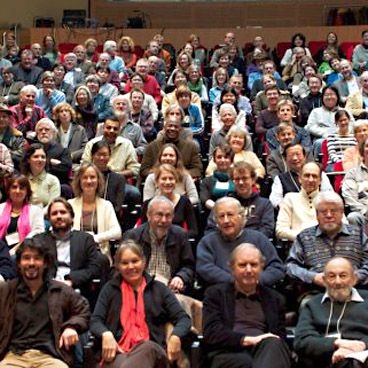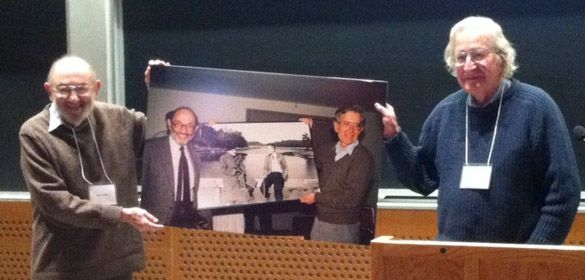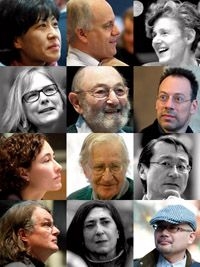To celebrate the first 50 years of MIT’s graduate program in linguistics, the department invited all alumni, former faculty and postdoctoral scholars to attend a Scientific Reunion, held at MIT in December 2011. More than 200 people gathered, and marked the occasion by revisiting the department and participating in a discussion of some of the foundational questions investigated by its past and present members.
Participants called it "an astonishing weekend of talks and other gatherings." David Pesetsky, Ferrari Ward Professor of Modern Languages and Linguistics, writes, "Intellectually, it was first-rate and exciting; there were some fireworks (just as we'd hoped). It was also a very emotional weekend. Collectively, this was the group that built the field, and they were celebrating 50 years of that."
In the beginning
Fifty years ago, in the fall of 1960, Jerome Wiesner, director of the Research Laboratory of Electronics (RLE) and William N. Locke, head of the Department of Modern Languages, proposed to MIT the formation of a graduate program in linguistics whose faculty was to include Noam Chomsky and Morris Halle. Both were affiliated with RLE and Modern Languages. Chomsky had skaken the field with Syntactic Structures (1957), a work that asked new quesions about the fundamental nature of language.
Wiesner and Locke’s proposal was approved and the new program was slated to begin the following fall. No efforts were made to recruit students. Nonetheless, a group of six graduate students arrived in September 1961 and seven or more joined the following year. Four years later, many of the dissertations of these first two classes became landmark studies in the fields of phonology (synchronic and diachronic), morphology and syntax (theoretical and computational), with semantics and phonetics added later. So have many of the 300-plus theses completed in the following 46 years of the program, and those of the students, and the students’ students, of that first generation and following ones.
Transforming the discipline
Originally focused on speech analysis and machine translation, the Institute’s linguistics scholars went on to seed a major transformation of linguistics as a discipline.
“At that time, it was widely believed that once we had a structural description of every language, the field would be over. There would be nothing more to do,” Chomsky recalled at the reunion. “The kinds of questions you’re talking about today could not even have been formulated back in the 1950s.”
While linguistics started as a research effort, within a few years The New York Times was reporting that MIT's graduate program was ranked first — "much to everyone's surprise," recalled Morris Halle, Institute Professor emeritus, who together with Chomsky led the section during its formative years.
Today, of course, it is no suprise. "Linguistics is one of the most distinguishing features of MIT,” said Deborah Fitzgerald, Kenan Sahin Dean of the School of Humanities, Arts, and Social Sciences, who welcomed attendees to the event.
International range and influence
Those who came — including all but one of the surviving members of the first PhD class — are a testament to the broad and lasting impact of the program. Alumni scholars arrived from all over the United States and from foreign countries, including England, Israel and Spain, to share personal recollections and to learn from the presentations. Topics over the three days ranged from the notion of derivations in linguistics to endangered languages, and from representations in phonology to evaluation metrics.
Alumni speakers included Professor John Goldsmith (1976) of the University of Chicago; Professor Ray Jackendoff (1969) of Tufts University; Professor Richard Kayne (1969) of New York University; Professor Danny Fox (1998) of MIT; Professor Colin Phillips (1996) of the University of Maryland; Bruce Hayes (1980) of the University of California, Los Angeles; Professor Janet B. Pierrehumbert (1980) of Northwestern University; Professor Emerita Lisa Selkirk (1972) of the University of Massachusetts; and Professor Paul Kiparsky (1965) of Stanford University — among many others.
After two days of talks, Saturday brought classmates, colleagues and friends together for dinner at the MIT Faculty Club, where they shared stories and reminiscences spanning the five decades. The event closed midday Sunday with a talk by Halle, who traced the history of the department and, through it, the field.
Two questions for MIT Linguistics alumni
For the reunion, the department invited answers to the following two questions from alumni:
Participants called it "an astonishing weekend of talks and other gatherings." David Pesetsky, Ferrari Ward Professor of Modern Languages and Linguistics, writes, "Intellectually, it was first-rate and exciting; there were some fireworks (just as we'd hoped). It was also a very emotional weekend. Collectively, this was the group that built the field, and they were celebrating 50 years of that."
In the beginning
Fifty years ago, in the fall of 1960, Jerome Wiesner, director of the Research Laboratory of Electronics (RLE) and William N. Locke, head of the Department of Modern Languages, proposed to MIT the formation of a graduate program in linguistics whose faculty was to include Noam Chomsky and Morris Halle. Both were affiliated with RLE and Modern Languages. Chomsky had skaken the field with Syntactic Structures (1957), a work that asked new quesions about the fundamental nature of language.
Wiesner and Locke’s proposal was approved and the new program was slated to begin the following fall. No efforts were made to recruit students. Nonetheless, a group of six graduate students arrived in September 1961 and seven or more joined the following year. Four years later, many of the dissertations of these first two classes became landmark studies in the fields of phonology (synchronic and diachronic), morphology and syntax (theoretical and computational), with semantics and phonetics added later. So have many of the 300-plus theses completed in the following 46 years of the program, and those of the students, and the students’ students, of that first generation and following ones.
Transforming the discipline
Originally focused on speech analysis and machine translation, the Institute’s linguistics scholars went on to seed a major transformation of linguistics as a discipline.
“At that time, it was widely believed that once we had a structural description of every language, the field would be over. There would be nothing more to do,” Chomsky recalled at the reunion. “The kinds of questions you’re talking about today could not even have been formulated back in the 1950s.”
While linguistics started as a research effort, within a few years The New York Times was reporting that MIT's graduate program was ranked first — "much to everyone's surprise," recalled Morris Halle, Institute Professor emeritus, who together with Chomsky led the section during its formative years.
Today, of course, it is no suprise. "Linguistics is one of the most distinguishing features of MIT,” said Deborah Fitzgerald, Kenan Sahin Dean of the School of Humanities, Arts, and Social Sciences, who welcomed attendees to the event.
International range and influence
Those who came — including all but one of the surviving members of the first PhD class — are a testament to the broad and lasting impact of the program. Alumni scholars arrived from all over the United States and from foreign countries, including England, Israel and Spain, to share personal recollections and to learn from the presentations. Topics over the three days ranged from the notion of derivations in linguistics to endangered languages, and from representations in phonology to evaluation metrics.
Alumni speakers included Professor John Goldsmith (1976) of the University of Chicago; Professor Ray Jackendoff (1969) of Tufts University; Professor Richard Kayne (1969) of New York University; Professor Danny Fox (1998) of MIT; Professor Colin Phillips (1996) of the University of Maryland; Bruce Hayes (1980) of the University of California, Los Angeles; Professor Janet B. Pierrehumbert (1980) of Northwestern University; Professor Emerita Lisa Selkirk (1972) of the University of Massachusetts; and Professor Paul Kiparsky (1965) of Stanford University — among many others.
After two days of talks, Saturday brought classmates, colleagues and friends together for dinner at the MIT Faculty Club, where they shared stories and reminiscences spanning the five decades. The event closed midday Sunday with a talk by Halle, who traced the history of the department and, through it, the field.
Two questions for MIT Linguistics alumni
For the reunion, the department invited answers to the following two questions from alumni:
- What was the broad question that you most wanted to get an answer to during your time in the program?
- What is the current status of this question? Has it been answered? Did it turn out to be an ill-conceived question? If it’s a meaningful question as yet unanswered, please tell us what you think the path to an answer might be, or what obstacles make it a hard question.








